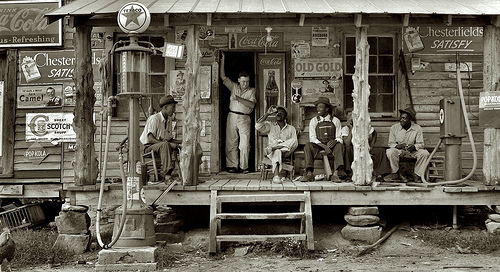

Horton's Store, Kateoplis, Person County, North Carolina, 1939
He invoked Dolly Parton and the memory of Elvis Presley, and groused, “Next thing, they’ll ban pink flamingos in front yards.”
Reed argued that this is yet another Lost Cause, lost “about the time [a man] lost the irretrievable right to take a leak off his own front porch” (a porch activity I forgot to mention). But, he wrote, “they have not yet taken [Southerners’] right to curse and defy.”
Local busybodies target the front porch.
In the small-town American South porch sitting was once a nearly universal pastime. As a place for sipping tea or Co’ Cola, smoking or dipping, telling stories, courting, and watching lightning bugs, the front porch was unsurpassed. Southern porches have been celebrated in song (“Swingin’” and “My Tennessee Mountain Home,” to name just two country music examples) and story (Zora Neale Hurston: “It was the time for sitting on porches beside the road. It was the time to hear things and talk.”). James Agee wrote about a porch in A Death in the Family (Samuel Barber set his words to music in “Knoxville: Summer of 1915”), and who can forget Faulkner’s Greek chorus of neighborhood men, sitting on the Bundrens’ porch in As I Lay Dying? A recent book on black Southern storytelling is fittingly titled The Power of the Porch.
More @ The Abbeville Institute

No comments:
Post a Comment